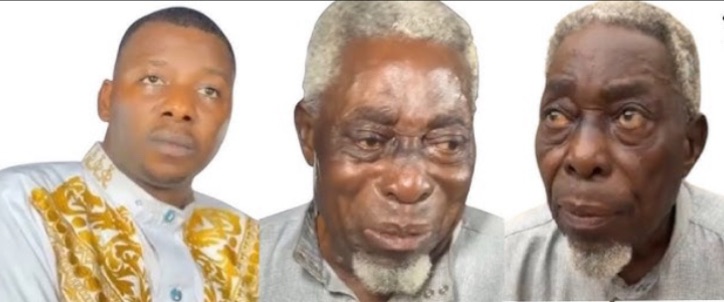In a shocking revelation, an 81-year-old man who claimed to have spent 48 years in Canada before returning to Nigeria with nothing—no wife, no house, no children—has been exposed as a fraud. His heartbreaking tale of loss and misfortune, which he used to scam the general public, has been uncovered as a well-orchestrated deception aimed at exploiting people’s kindness.
The elderly man, who falsely identified himself as Professional Amos Ishola Awodiya, not only fabricated his life story but also made an outrageous claim that his international passport was being held by the Central Bank of Nigeria (CBN). This bizarre statement was meant to further strengthen his lie, making people believe that his misfortunes were due to external circumstances rather than deception.
Upon his return to Nigeria, this 81-year-old man narrated a heartbreaking story that quickly gained attention. He claimed:
• He had lived and worked in Canada for 48 years, only to return empty-handed.
• His wife and children had all passed away, leaving him completely alone.
• He had no house, no savings, and no source of support, and was struggling to survive.
• His international passport was allegedly being held by the Central Bank of Nigeria (CBN), which he suggested was a key reason why he could not access his supposed wealth or return to Canada.
This tragic story moved many compassionate Nigerians, who stepped in to offer help, money, and even shelter. The elderly man took his plight to Agbala Gabriel, a religious and humanitarian center, where he manipulated the emotions of both individuals and religious leaders to secure donations and sympathy.
However, as days passed, discrepancies in his story started to surface.
The Truth Begins to Unravel
Upon deeper investigation, it was discovered that:
• The man never spent 48 years in Canada, as he claimed.
• There was no record of his supposed wife and children or their deaths.
• His international passport was not with the Central Bank of Nigeria (CBN)—a claim that made no logical sense, as the CBN does not hold individuals’ passports.
• His entire story was fabricated to exploit the goodwill of others.
People who initially supported him began questioning his authenticity, and soon, evidence emerged proving that his claims were all lies.
The Agbala Gabriel Deception
This fraudster did not stop at just telling his fake story—he brought his deception to Agbala Gabriel, a place where people seek spiritual healing, guidance, and support.
There, he posed as a helpless and hopeless old man, drawing in kind-hearted individuals who offered him money, food, and shelter. Some people even started a fundraising campaign to help him rebuild his life.
Unfortunately, all of this goodwill was based on lies. This man was not a victim of life’s misfortunes—he was an opportunist, skillfully exploiting people’s kindness for personal gain.
Professional Amos Ishola Awodiya Reacts
Public affairs analyst Amos Ishola Awodiya has weighed in on the situation, emphasizing the increasing trend of fraudulent sob stories and the need for greater caution when offering financial assistance.
In his statement, Awodiya highlighted:
1. The rise of emotional manipulation scams – Many fraudsters are now using fake tragic stories to deceive people.
2. The need for verification – People should always verify before giving money or assistance.
3. The responsibility of religious and charitable organizations – Centers like Agbala Gabriel must ensure thorough background checks before providing financial support.
Awodiya further warned that such scams not only deceive good-hearted individuals but also make it harder for real victims to receive help, as they create skepticism in the minds of potential donors.
Lessons Learned – How to Avoid Falling for Fake Sob Stories
This incident serves as an important reminder that while helping others is a noble act, Nigerians must also be careful and discerning to avoid falling victim to fraudsters.
1. Verify Before You Donate
Before giving money, always verify the person’s story and check for inconsistencies.
2. Beware of Emotional Manipulation
Scammers often use tragic and desperate stories to trigger an emotional response. If a story sounds too dramatic, it might be false.
3. Support Verified Charities and Organizations
Instead of giving money to individuals with unverifiable stories, it is safer to donate through recognized charities and religious groups that can properly vet those in need.
4. Encourage Proper Investigations
Religious and humanitarian centers like Agbala Gabriel must implement screening processes to ensure that only genuine cases receive financial and material support.
What Happens Next?
With his scam now exposed, many of those who donated to him feel betrayed and deceived. The question remains: Will he face legal consequences, or will he simply disappear and attempt the scam elsewhere?
This case is a wake-up call for Nigerians to be more vigilant. While generosity is important, it is also crucial to be cautious and ensure that help goes to real victims—not fraudsters looking for easy money.
As for the 81-year-old man, his lies have been exposed, but the damage he has done—both financially and emotionally—will not be easily forgotten.
